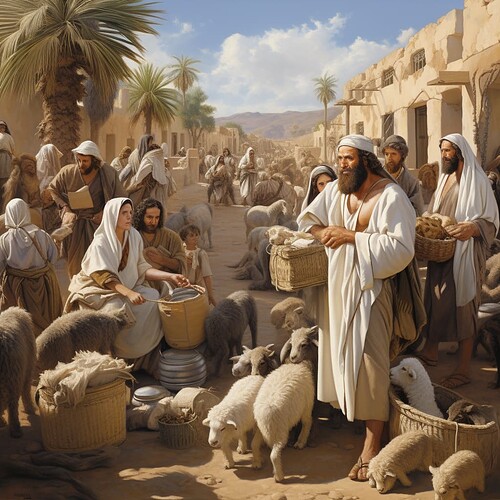 February 12: Exodus 22 - God’s Detailed Laws
February 12: Exodus 22 - God’s Detailed Laws
Establishing Order and Justice in Society
 Introduction
Introduction
We dive into Exodus chapter 22, which provides a detailed list of laws delivered by God through Moses to the Israelites. Exemplifying just how meticulously God cares for human society, these legislations are related to various aspects of their daily life and interactions.
 Safeguarding Personal Properties
Safeguarding Personal Properties
Exodus 22 begins with conditional laws governing property rights, stressing accountability and fair restitution. If someone steals or damages another’s property, they are required to compensate in kind, often more than what was taken.
![]() Key Verse: Exodus 22:4 “If the theft is certainly found alive in his hand, whether it is an ox or donkey or sheep, he shall restore double.”
Key Verse: Exodus 22:4 “If the theft is certainly found alive in his hand, whether it is an ox or donkey or sheep, he shall restore double.”
 Protecting Vulnerable Populations
Protecting Vulnerable Populations
We also witness God’s concern for the marginalized within society; His laws shield widows, orphans, and the poor, indicating His unwavering commitment to equitable justice.
![]() Key Verse: Exodus 22:22-23 “You shall not afflict any widow or fatherless child. If you afflict them in any way, and they cry at all to Me, I will surely hear their cry.”
Key Verse: Exodus 22:22-23 “You shall not afflict any widow or fatherless child. If you afflict them in any way, and they cry at all to Me, I will surely hear their cry.”
 Key Themes and Reflections
Key Themes and Reflections
1. Promoting Just Society: The teachings in Exodus 22 lay the groundwork for a righteous and harmonious society where the rights of individuals are respected, and everyone, especially the vulnerable, is protected.
2. God’s Compassionate Nature: The laws emphasize God’s care for all His creation, especially the marginalized, resonating with our call to “love our neighbor.”
 Today’s Application
Today’s Application
In our bustling world, let’s strive to be more considerate of others’ rights, taking responsibility for our actions, and actively caring for those in need in our communities, as God desires.
 Hidden Gem
Hidden Gem
While it might seem tedious, the detail within these laws shines a spotlight on God’s meticulous love for us, providing precise guidelines to promote harmony and mitigate disputes.
 Reflective Q&A:
Reflective Q&A:
![]() The Significance of the Laws: A: They serve as profound reminders of God’s detailed care for us and the necessity to uphold justice for a harmonious society.
The Significance of the Laws: A: They serve as profound reminders of God’s detailed care for us and the necessity to uphold justice for a harmonious society.
![]() How to apply these teachings today? A: By developing a keen sense of responsibility, showing respect for others’ rights, and extending love to marginalized individuals.
How to apply these teachings today? A: By developing a keen sense of responsibility, showing respect for others’ rights, and extending love to marginalized individuals.
 Join the Discussion:
Join the Discussion:
ponder over Exodus 22 and share how these teachings resonate with your life, and how we can together build a more just and compassionate society.
 See You Tomorrow in Exodus 23:
See You Tomorrow in Exodus 23:
Venture into more of God’s precise instructions for maintaining peace, justice, and respect in society with the Sabbath laws and societal rules.
Final note
Exodus 22 amplifies how God, in His wisdom, designed laws for an orderly, equitable, and loving society. It’s a gentle reminder that God cares about our relationships with one another as part of our spiritual journey towards Him.
